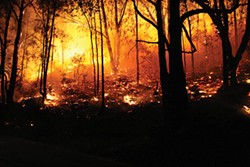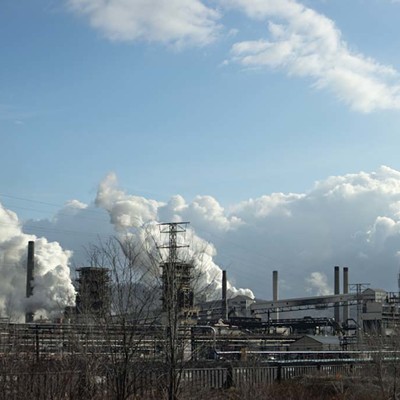This is the normal we’ve been waiting for: After a week as front-page, top-story-tonight news, the monstrous wildfire that erupted May 3 in Fort McMurray, Alberta, was relegated to the newsbriefs in your daily paper, then not even that.
It won’t be so easy to move on, of course, for the 88,000 Canadians who fled Fort McMurray. That will take years. But it’s fair to ask some questions, particularly about the fire’s roots in climate change. Especially because those were the questions too few were asking when people were still, you know, paying attention to this disaster.
While wildfires have always scorched the northern forests, with this cataclysm we were told that the immediate cause was unusually hot and dry weather: The region got little winter snowfall, and even that melted early. Surely the role of climate change was on many minds. Yet you could read and hear thousands of words, and see plenty of footage, of Fort McMurray ablaze without hearing a peep factoring in climate change’s influence.
Of the few outlets that did go there, many quoted Mike Flanigan, a professor of wildland fire at the University of Alberta. The conditions that created this fire were “consistent with what we expect for climate change,” he said. No factor can ever be fingered as the single ultimate “cause” of a natural disaster. But anything that makes forests like those surrounding Fort McMurray hotter and drier must be considered. Flanigan noted that the area of Canada burned by wildfire annually has more than doubled since the early 1970s. And Canada’s fire season continues to expand.
Still, the real third rail here is Fort McMurray’s livelihood. The greenhouse-gas emissions driving climate change are primarily the result of burning fossil fuels, and guess what industry made Fort McMurray a boomtown? For decades, its growth has been driven entirely by the tar sands, a Florida-sized swatch whose deposits of bitumen can be refined into oil. And Canadian tar-sands oil is about the dirtiest energy on earth, mined out of one of its most pristine places.
Bitumen isn’t liquid, but gunky, and it’s not drilled for but rather strip-mined and melted from the earth with steam. The process creates lakefuls of toxic waste, and causes incalculable damage to the forest ecosystem as well as to the atmosphere: It takes two tons of tar sands to produce one barrel of oil, and up to three times the energy to produce that barrel as it would a barrel of conventional oil. This is extreme energy, like mountaintop-removal coal-mining or deep-sea oil-drilling.
So climate change just mauled us at one of its epicenters. But Canadians who pointed out climate change’s role, however delicately — among them Canada’s Green Party leader, Elizabeth May, who called the fire “a disaster that is very related to the global climate crisis” — were attacked by critics who said they were disrespecting the victims or politicizing a crisis.
When a house burns down, investigators immediately ask if it was arson, and who was responsible, without anyone claiming disrespect or politicization. To be clear: Fort McMurrayians are no more to blame for climate change than is anyone else in our fossil-fueled society. But at what point are we permitted to say that disasters that precisely echo the effects of climate change (as scientists have been describing them for decades) are, in fact, attributable to climate change? Or that, as with Hurricane Sandy, we’re going to be seeing a lot more of them in the years to come.
Maybe we can talk about it after “normal” returns — and everyone stops caring about Fort McMurray? Exactly when things in Fort McMurray might “return to normal” was a common theme in news stories about the fire. Normal would include, one supposes, mining the tar sands again. And it would include slipping cozily back into denial about climate — just like we do about gun control a week after the latest mass shooting.
A 2015 U.S. Forest Service report indicated that fire seasons here are 78 days longer than in 1970. “The U.S. burns twice as many acres as three decades ago,” the report added. Wildfires, remember, don’t happen just in Canada.














